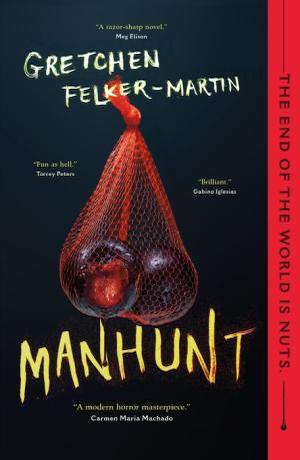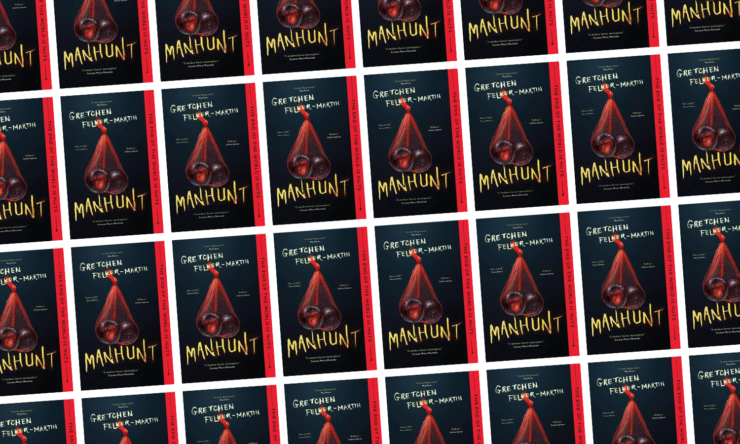A virus hits the North American continent, transforming anyone with “too much” testosterone—and yeah, that includes people with PCOS—into a ravening monster. But society drags on, and so does daily life. Beth and Fran are manhunters, scouring the New England coast harvesting organs from the feral infected for the production of hormones to keep themselves and other women safely supplied. Their routine is interrupted, though, when a separatist TERF militia rolls into town—driving their good friend Indi to accept a job offer from a nearby billionaire bunker-brat to protect them. What could go wrong? Just about everything.
When I heard the premise of Manhunt, I thought, a gender apocalypse horror novel from a trans perspective? Yes, please, and thank you. Gretchen Felker-Martin builds onto the premise a hilariously spiteful reversal of the implicit cultural belief that “testosterone over a certain arbitrary level turns you into a slavering animal driven only to rape and eat raw meat”—basically asking, “okay, so what if that were true? Then what?” The conceit is both a nod to the classic Tiptree Jr. story, “The Screwfly Solution,” and an engagement with transphobic rhetoric spilling all over the place online.
Sitting down to actually draft this review-essay, I did a hard think on how to frame the difficult, productive experience I had reading Manhunt. Serendipitously, though, the last book I finished before picking up Felker-Martin’s novel was Jennifer Doyle’s Hold it Against Me: Difficulty and Emotion in Contemporary Art. In the first chapter, which is partially about the art practice of Ron Athey, Doyle writes,
When we allow our thinking to be oriented by the terms and values of controversy, we take our cues about the work from people who have not seen the work or who have seen it and have rejected it with the force of a violent allergy. […but as for the audience open to the difficulty,] they knew what they were getting into, even if they didn’t know exactly what was going to happen. […] in the space of the performance, you adjust and accommodate to what’s happening and also to the flexibility of your own desire. If you can’t, you look away or you leave.
If you’re going, “why is there a block-quote of art criticism opening this review of a horror novel,” well. With the same level of compassion Doyle has for her own impulse to look away occasionally: I appreciated the fuck out of this novel, and also, it seriously isn’t going to be for everyone.
Buy the Book


Manhunt
Manhunt is a brilliant, vicious piece of horror fiction, and reading it felt like laying open an infected wound to drain then doing a gauze-pack: unhealed but less agonizing, maybe cleaner and clearer. Necessary. And I don’t say that in an edgy, dare-you way. Felker-Martin is too purposeful with her choices as a novelist to be edgy. I say it as a trans reader who grappled with the livid, pulsing fear of the book… as well as its honest, unflinching, and occasionally intra-community social critique. The novel echoes (then deconstructs), in phrases and scenes and rhetoric, a lot of contemporary lived experiences of transphobia and homophobia—predominantly from the perspectives of trans women, which matters.
Like, we’re talking “begins the second section of the novel, ft. fascist TERF death-squads, with a Janice Raymond quote” levels of emotional difficulty.
I don’t know (or, frankly, care) how many of those cues cis readers will pick up, but the directness Felker-Martin deploys them with—or, simply holds them up to harsh light with—knocked me flat a few times. Which means the book works: that’s the genre! But, importantly, there’s also compassion behind the knocking-flat. Ultimately, Manhunt is a novel of social (and genre) critique with a hopeful streak buried at its heart.
For example, the book is big-time body horror. Where the genre often presents disability, fatness, transness, and/or queerness as the fearful thing, however, Felker-Martin instead writes body horror informed by life in these marginalized categories. Similar to the approach to gender apocalypse via literal testosterone poisoning being “okay, and so what?”, the novel starts from a place of “okay, and so what?” with the horror of bodies too. Debility isn’t a source of terror, but the social experiences of debility are: how other people treat someone disabled, or how mobility/accessibility are further impacted by disablement during societal collapse.
Furthermore, in story about testosterone monsters, sex presents a bodily horror—but also a potential pleasure. Manhunt grapples frankly with sexuality and sexual trauma: rape, coercion, violation of consent, and generally fucking for a whole host of reasons other than desire all happen on the page. Reproductive justice and violence are also important, as a threat experienced by people with uteruses in this world. At the same time, though, some of the most glorious, breath-of-fresh-air moments in the novel are explicit sex scenes between women. And in several of these sex scenes, pleasure comes from appreciating a fat partner’s body as abundant, beautiful, fuckable—which I could use to see far more often.
However, while body horror is definitely on the table, Manhunt is an apocalypse novel—and apocalypse novels are inherently about societal horror. Interpersonal, relational terrors around power, control, and ‘the quiet part being said loud’: those are Felker-Martin’s materials, here. The social commentary arises largely through our characters: each of them is a certain type of person, in certain types of relationships. This structure enables the novel’s expansive, complicated reflections on how challenging individual humans can be to themselves, and to one another. No one’s perfect, and no one’s righteous, nor are those things possible… though, some people are far more awful than others.
Fran and Beth are our lead protagonists; they’ve known one another since high school and are both trans, but their experiences differ wildly otherwise. Working with conflicts arising from assumptions based on class and passible-ness and politics, Felker-Martin gives significant consideration to trans struggles around self-perception, longing, and jealousy… but also, solidarity versus assimilation. And while I ain’t going to quote the specific line, I knew the book had gotten me good when I had an instinctive flinch of, “don’t say that where a cis person might see it!” about an emotion I’d also felt it myself—but hadn’t ever seen written in the open. Powerful, that.
Then we’ve got Indi, a cis woman doctor, whose fatness, brownness, and queerness strongly inform her understandings of the future she’s attempting to survive. Medical ethics, plus what you might find yourself doing to others in an attempt to save yourself or your loved ones, are core to her narrative. Robbie, a trans man, is also a complex figure within the novel. He occupies, sometimes through others’ assumptions about his masculinity, a role of necessary violence wherein his own emotions and needs are disregarded. Also, how differently-painful his experience of “T-day” was—not only a denial, but a condemnation of his prayers to be made a man—echoed for me. That little critique reflects on off-shoot effects of the casual shittiness some queer-feminist spaces express toward masculinity itself as an inherent betrayal.
We’ve also got direct villains: the TERFs and their militia, plus the rich white girlboss Sophie. Each of them serves a role and purpose, too. There’s Ramona, the fetishist who’ll fuck a transfemme person then allow them to die; the Teach, an obsessed bigot ex-military interrogator/torturer who heads a fascist army of her own; and members of the militia who are perfectly capable of rape, violence, and abuse despite the supposed inherent moral superiority and safety of being “born womyn.” (Ahem.)
But when the TERFs annex their town, Beth watches the listening crowd and thinks, “It wasn’t the few who’d cheered that frightened her; it was the rest, watching with guarded expressions, not looking at those among their number who cried Go back to Maryland, you fucking Nazis […] That was what scared her. The women who stayed silent.” Failures of alliance with trans women by cis women rest at the thematic core of Manhunt. So, too, do failures of alliance with trans women by queer people: the kind who’ll put up cute signs reading “this is a safe space for people of all genders, races, faiths, and sexualities!” then, when push comes to shove, expel the girls who are trans from their midst—willing to kill them, by both action and inaction.
Manhunt asks the audience to take a good, long look in the mirror and consider, “would I?” But—and here’s where the hard-fought hope comes in—ultimately, the novel continues on to ask, “all right, so you did an awful thing. What will you choose to do now?”
The book’s central struggles are around survival within communities: what it means to build one, how building one can go horribly wrong, and who we leave out versus who we prioritize. Felker-Martin presents multiple forms of communality, from the bunkers to the militia to the town to Fort Dyke in the end—always wrestling with the constant labor of “doing ethics together.” The ending of the novel is a rough read, but where the audience lands is a space of quiet. There’s a possible future to be fought for while maintaining a community of support, across divisions of experience: one aiming to be inclusive in truth rather than just as performance.
That last feeling, to be honest, is what makes me read the novel as hopeful. Despite, or maybe because of, the extremes of cruelty and violence contained within the text—none of which, by the way, felt exaggerated to me—it’s possible for some of our characters to survive together. It’s possible to live on, and maybe to build something better.
Manhunt is published by Nightfire.
Lee Mandelo (he/they) is a writer, critic, and occasional editor whose fields of interest include speculative and queer fiction–especially where the two coincide. Summer Sons, their spooky gay debut novel, was recently published by Tordotcom, with other stories featuring in magazines like Uncanny and Nightmare. Aside from a brief stint overseas, Lee has spent their life ranging across Kentucky, currently living in Lexington and pursuing a PhD in Gender Studies at the University of Kentucky.










